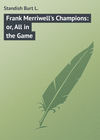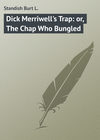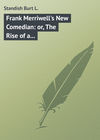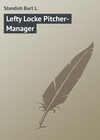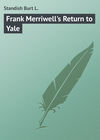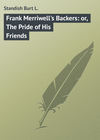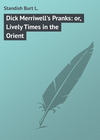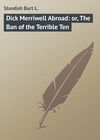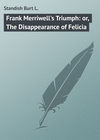Buch lesen: «Frank Merriwell's Champions: or, All in the Game», Seite 11
CHAPTER XXIII – CHOICE OF PONIES
Fearing the boys would attempt to retaliate, Hans and Ephraim closed and barricaded the door, and the Dutch boy shouted that he would “soak” anybody who tried to force an entrance.
Thoroughly disgusted with the turn affairs had taken, Merriwell and his friends sought towels and dry clothing, and decided to let Hans and Ephraim alone for the rest of the night.
In the morning every one about Springbrook Farm knew of the “ghost joke,” and the boys were “jollied” unmercifully, Kenneth St. Ives being forced to endure it with the others.
The general uproar in the summerhouse had been heard by those in the mansion, and it had set the hounds to barking in the stable, but the shouts of laughter coming from the house told that it was some sort of frolic, so no one sought to investigate.
Ephraim and Hans came forth in the morning, arm in arm, although they made a most grotesque couple, the Dutch boy being short, round and fat, while the Yankee lad was tall, lank and angular.
The faces of this odd pair were grave and solemn, and their air of innocence was refreshing to behold.
“Good-mornin’, fellers,” nodded Ephraim. “I hope yeou all slept fust rate late night?”
“How you peen dese mornin’, boys?” inquired Hans, with apparent concern. “I hope you didn’t disturb me der night in. I peen aple to slept shust like a top all der night ofer mitout vakin’ ub ad all.”
“I am glad you slept so well,” smiled Frank. “There was some noise about the house in the night, and I thought it might have aroused you.”
“I nefer heard something ad all,” declared Hans. “I pelief me I hat a tream someding apout a ghost, but dot peen all.”
“Oh, say,” grunted Browning, clinching his huge fist and shaking it close down by his side. “You wait! There are other days coming!”
“Vell, I hope so,” said the Dutch boy, blankly. “I don’t vant dese von to peen der last von.”
After breakfast a jolly party came over from the Meadowfair clubhouse, five miles away. There were nearly a dozen young ladies, and half as many gentlemen. It was plain they were in the habit of visiting Springbrook Farm often, for they were warmly welcomed, and made themselves quite at home.
“This is jolly!” cried Kenneth St. Ives, as he introduced Frank to Paul Stone, the leader of the party. “I knew something in the way of sport would turn up to-day. Do you play polo, Mr. Merriwell?”
“Yes,” nodded Frank, with unusual eagerness; “I have played the game, but it has been some time since I have touched a mallet.”
“Mr. Stone is a member of the American Polo Association, as also is Steve Fenton, my cousin. Harden and I have applied, and we expect to get in. Father has caused a beautiful green to be laid over yonder. He has worked upon it till it is as solid as the finest green in the country, and we are looking to enjoy several meets here before we return to the city. We have been having a few games, and I think it is royal sport.”
“It is the greatest sport in the world!” exclaimed Paul Stone, enthusiastically.
Frank smiled.
“It can’t be that you have played much football or baseball, Mr. Stone,” he said.
“Baseball hasn’t the dash and go of polo,” declared Stone; “and too many accidents happen at football. It is a dangerous game.”
“There is some danger in polo,” said Merry.
“Just enough to make it spicy,” declared Stone. “There is not as much danger of getting broken noses and broken necks as in football.”
Frank’s blood was beginning to bound in his veins, for the thought of a hot, exciting polo game, with its sharp races and its fierce charges, was quite enough to arouse the sporting instinct within him. He was like a war horse that sniffs the smoke of battle from afar.
“Well,” he cried, “if there is to be a polo match, I’d like to get into it.”
“You can,” laughed Kenneth. “You shall have Liner, the finest pony in our bunch. That animal knows as much as a human being. Why, he can almost play polo alone!”
A short distance away Stephen Fenton was talking with another of the Meadowfair party. He was trying to be sociable in his sullen way, but his ears were open to all that was passing near at hand, and he plainly heard the conversation concerning polo.
Kimball, the man Fenton was talking with, also heard something of it, and he exclaimed:
“Polo is the very thing! I had thought of a coaching party, but it is too late for that this morning. You’ll play polo, won’t you, Fenton?”
“Yes,” nodded Fenton, “I’ll play with your side.”
“I think that will be agreeable to Stone,” said Kimball; “but I don’t believe Springbrook will want to give you up.”
“Well, I’ll not play with those stiffs,” muttered the sullen-faced fellow. “I want a good opportunity to play against them.”
In a short time it was arranged. For Springbrook, St. Ives, Harden, Merriwell and Diamond were the players; for Meadowfair, Stone, Kimball, Fenton and a jolly young man by the name of Lock were to handle the mallets.
“Come, Mr. Diamond and Mr. Merriwell,” called Kenneth; “I will provide you with suits.”
They followed him into the summerhouse, where such paraphernalia was kept, and in a short time all three were rigged out in white breeches, striped blouses and high boots.
“You will find Liner a dandy polo pony, Mr. Merriwell,” declared Kenneth. “Father paid nine hundred dollars for him.”
“It’s jolly good of you to let me have him, St. Ives,” said Frank. “Why don’t you ride him yourself? I don’t feel like taking him away from you.”
“Oh, that’s all right,” laughed Kenneth. “You are my guest. I’ll ride Coffin Head.”
“Coffin Head! What a name for a horse!”
“He’s an old-timer – a gone-by; but he knows the game, and that is something in his favor. Of course, I do not expect to cut much ice with him, but I want Diamond to have a good mount. Coffin Head has seen his day, but he has been a dandy.”
Frank mentally decided that St. Ives was a fine fellow, and all right in every way.
They went out to the stable, hearing the ringing sound of a coach horn, and seeing a coaching party approaching along the road.
“There’ll be a jolly crowd here!” cried Kenneth. “There’s a party from Cloverdale. We’ll have no end of sport, fellows!”
There was a flush in Diamond’s cheeks, and it was plain he was eager for the fray, although he said very little.
Just as they were on the point of entering the stable, Stephen Fenton rode out on a handsome pony with four white feet and a general smart look.
St. Ives halted in astonishment.
“Hello, there!” he cried. “What are you doing with that horse, Steve?”
“I’m going to ride him in the match,” answered Fenton, grimly.
“I guess not!” exclaimed Kenneth. “I have promised Liner to Mr. Merriwell.”
“Can’t help that,” retorted Fenton, with a sneer. “I rode him in the last match.”
“And so you should be willing to let somebody else have him to-day. Don’t be piggish, Steve.”
The man scowled.
“I didn’t suppose anybody would object to letting me have him to-day, and that is why I took him. I see you are afraid of being beaten. What pony did you propose to let me have?”
“Any one but that one. I did think of riding Coffin Head, but you may have him.”
“Coffin Head! You must think I’m a fool! Why, that old cob is played out, and I’d be a perfect guy on him. You can’t work that on me, Ken.”
St. Ives was angry. He showed it in his face and voice.
“I don’t care what you ride! You can have anything but Liner.”
“And I’ll have Liner!” flung back Fenton, defiantly. “I’ve got him, and I’m going to keep him. What can you do about it? We’ll show you chaps up in great shape.”
Then he started the pony up, and rode away toward the green.
St. Ives seemed about to follow him.
“I’ll make him give that pony up!” he grated. “He has no right to take Liner! If he doesn’t want to play, let him get out.”
“I wouldn’t have any trouble with him about it,” said Frank. “If you do, he’ll make a big fuss about our being scared. Let’s look at the other ponies first, anyway.”
After a few moments of hesitation, St. Ives led the way into the stable, and the boys looked the other ponies over.
One of them was a homely old crock, with knees and hocks bunched up out of all semblance to those built on strictly anatomical principles. This pony attracted Merriwell’s attention.
“That is Coffin Head,” said St. Ives.
Instantly an inspiration seized Frank.
“If you don’t mind,” he said, “I’ll ride Coffin Head.”
Kenneth gasped.
“You can’t mean it!” he exclaimed.
“I do,” nodded Merry. “Somehow I’ve taken a fancy to the old fellow. You say he has been a good one?”
“One of the best.”
“Then he hasn’t forgotten the tricks of the business. I’m going to try him.”
“The boys will have sport with you, Merry,” said Diamond.
“Let ’em,” smiled Frank. “I may get as much sport out of it as they do. May I have Coffin Head, St. Ives!”
“Of course you may if you want him,” said Kenneth, “but I’m sorry that – ”
“Never mind it!” came gayly from Merriwell. “Saddle up old Coffin Head for me, boy,” he cried, to one of the assistant hostlers. “I’ll manage to take some part in the game. Hurrah for Coffin Head, the old-timer! He may prove a surprise party for somebody.”
CHAPTER XXIV – THE FIRST GO
Tang! tang!
It was the timekeeper’s gong, and the game of polo was begun with a charge.
Each team had lined up within twenty feet of their respective goals, and, as the ball was dropped in center field, the little ponies tore forward like blooded racers.
It was a spectacle to send the blood leaping in an instant.
For all that the game had been hastily gotten up, the boundary line was crowded with the élite of the countryside. It seemed as if people had risen from the ground.
Merriwell’s friends were all together, and, with the possible exception of Browning, they were keenly interested. Bruce was stretched out in a lazy position on the ground, seemingly as apathetic as usual.
Bart Hodge’s dark eyes were gleaming and his cheeks glowing.
“Oh, if I could have taken part in that!” he muttered. “I don’t believe Diamond can play the game a bit better than I can.”
Bart was disappointed, and a feeling of jealousy toward Diamond had been aroused in his heart. It began to seem that Frank cared too much for Jack.
“It’s queer, too,” thought Hodge. “Diamond was growling all the time while we were in the West, and he made the rest of the crowd tired. Merry is the only one who has had any patience with him; but that’s just like Frank. He’s mighty queer, and I don’t understand him now, for all that I have known him so long.”
Kenneth St. Ives was captain of the Springbrook side, while Paul Stone commanded the other side.
“Soy,” cried Mulloy, “will yez take a look at thot ould bob Frankie is shtraddle av! Did yez ivver see th’ loikes av thot?”
“Gol darned ef that don’t look jest like dad’s old plaow hoss!” laughed Ephraim Gallup. “Ther sight of that critter makes me wish I was to hum on the farm. I’m humsick, b’gosh!”
Bruce Browning grunted and looked disgusted.
“Merry must be a fool to take such a pony!” he growled. “They’re making a guy of him.”
“G’way dar, boy!” muttered Toots, shaking his head. “Don’t yeh beliebe yehself! Dey don’ mek no guy ob dat boy ver’ much.”
“Say, Browning,” cried Rattleton, excitedly, “you ought to know better than to think anybody can fake a mool – I mean make a fool of Frank.”
“Yaw!” nodded Hans; “I oughter known petter dan dot, hand’t you? Vot do I take you for, Prowning! Vere you peen all my life, ain’d id? You don’d fool Vrankie Merrivell haluf so much as I think you can, you pet my axidental bolicy.”
In the opening charge Frank did not get in quite as quick as the others. Mounted on Liner, Steve Fenton shot down on the ball, and with a skillful crack, sent it skimming toward the Springbrook goal, causing a shout to go up from the spectators.
“He’ll make a goal for Meadowfair, in less than two – Great Scott! how’d the boy do that?”
Frank, somewhat behind the others, had caught the ball as it skimmed like a bullet over the ground, even though it seemed that he must have swung his mallet almost at the same instant as Fenton. The first crack was answered by a second, and the basswood ball suddenly went skimming back toward the Meadowfair side, with Diamond racing after it to send it through.
But Liner showed his mettle. It did not seem that Fenton paid the least attention to the pony, but the creature twisted about in a moment, and carried its rider along at Diamond’s side.
It was a brief but most exciting race, and the spectators cheered and waved their handkerchiefs.
“Go it, Diamond, old boy!” cried Harry Rattleton.
“Go id, Shack, oldt poy!” shouted Hans, hopping about like a toad. “You vill pet on my head!”
“Git doawn an’ crawl, gol darn ye!” whooped Ephraim. “Naow hit her a knockaout blow, and – Great gosh!”
In a most skillful manner Fenton’s pony had forced Diamond’s mount over, and the dark-faced man swung across in time to get a crack at the ball. The skill with which he struck it told that he was the most dangerous player on the Meadowfair side.
“Look out there, Harden!” cried St. Ives.
Harry stopped the ball, but it caromed from his mallet and came near going out of bounds. In a twinkling there was another hot rush and a threatened crash. Immediately all the players were clumped about the ball.
“Where are you, number one?” cried Paul Stone. “Strike, Kimball – strike, man! What’s the matter with you?”
For some moments the ball “hung,” and the players “dribbled”; but they were cool, and Lock made a neat and quick turn, passing the ball to Fenton, who took it up and hit it to boundary.
Over the board went the ponies, and the sticks crooked as they tried to give the ball a fillip outside. But Diamond, “half-back” for Springbrook, saw his opportunity, made a rush and a hard backhander on the near side, and out shot the little white sphere on its way to glory.
Merriwell was on it, as if he had been waiting for that very play. His stick, which he had selected with great care, seemed to swing free for a moment from the strap about his wrist, then the malacca did its work.
“Hooray!” cried Ephraim Gallup. “It’s a goal sure! Hooray!”
“Yaw!” screamed Hans, “id peen a dandy!”
“Outside! outside!”
“Who says outside?” snapped Rattleton. “The referee? I know better! It’s a goal sure!”
“Outside, I tell you!” came the voice of the referee, and the game stopped.
It was a disappointment for Frank’s friends, for they had felt certain he would make a goal, but the fairness of the referee was not to be questioned.
The captain of the Meadowfairs had the strike-off, and the Springbrooks fell back from the line.
But Stone was cunning, and he gave the ball a clever sweep to right field, and away from his goal. His “forward” knew the trick, and Liner was keyed up for a race to boundary.
But Frank had seen that trick before, and he resolved to find out what sort of stuff Coffin Head was made of, now that there was a good opportunity. The pony had handled himself with such ease and skill, for all of his awkward and homely appearance, that Merry was more than delighted, and now came the supreme test.
Liner flew out after the ball, upon which Fenton’s eyes were steadily fastened. But Coffin Head was in the race, and the old crock didn’t do a thing but spread himself. The way he tore along over the ground amazed everybody who saw it. It seemed that the old horse had renewed his youth and was out for blood. He made the run of his life to get his rider on that ball. Like a meteor he flew across the green, and Liner was fairly beaten, causing Frank Merriwell’s friends and admirers to rise up and shout with astonishment and delight.
The check was too sudden, however, and the old pony slid on his haunches. Then up rushed a mass of men and ponies, making for a moment a wild mêlée.
Kimball got a crack at the ball, but it glanced off the ribs of Harden’s pony, causing the animal to wince and swerve.
That let in Merriwell, who had brought Coffin Head about, and he made a skillful stroke. As he did so, he felt something whistle past his head, and realized that he had narrowly escaped a blow that must have spoiled the effectiveness of his work.
Frank did not take his eyes off the ball; but, nevertheless, he saw it was Fenton who had attempted the foul stroke, being unable to reach the ball himself.
Diamond went down on the sphere with a rush, and carried it along toward the enemy’s posts. With a clean lead at the proper moment, the Virginian, who had already showed himself a perfect horseman and perfect polo player, sent the white ball sailing through the timber, and Springbrook had made the first goal.
CHAPTER XXV – THE END OF THE GAME
Diamond was heartily congratulated, and his dark face flushed with pleasure over his success.
“But I didn’t do it alone,” he declared. “Merriwell deserves as much or more credit, for he sent it out of the bunch, and gave me my chance at it.”
“You fellows must have played together a great deal,” said Harden. “You work together perfectly.”
Frank laughed.
“We never played together in a game before,” he said. “I didn’t know Diamond played polo till a short time ago.”
“It’s remarkable!” smiled St. Ives, who was delighted over the work of his team. “And old Coffin Head is right in the game.”
“You bet!” cried Merry. “He is an old dandy! I wouldn’t swap him for Liner now!”
“But he has not done such work this season. He is in his old-time trim, and I believe two-thirds of it comes from his rider.”
Diamond touched Frank’s arm, and drew him aside.
“Say, Frank,” he whispered, “do you know you came near getting a crack over the head?”
“Sure,” nodded our hero.
“Well, take my advice and look out for that Fenton. I saw him when he struck at you, and I know he would have struck just as quick if his mallet had been made of iron.”
“I’ll watch out for him, Jack.”
“Do it, and I’ll keep my eyes open myself.”
Lock had strained his side twisting in the saddle for a stroke, and a fellow by the name of Hawley was substituted. Kimball and Stone both rushed to the stable to change ponies, and Hawley called for another pony in the place of the one Lock had ridden. Of the Meadowfairs, Fenton was the only one who retained his mount.
Harden was the only Springbrook man who made a change. His pony had not acted satisfactorily, although it was considered a fairly good animal. But it is an old saying that “the more a man knows about polo ponies the less he knows about them,” and the paradox is an indisputable truth.
Nearly all polo ponies are Western bred, and have broncho blood in them. A broncho is unreliable at best. For a thousand times he may serve you perfectly, and then, when you least expect such a thing, for no apparent reason, he may prove utterly unreliable.
Ponies for expert players must have lots of speed and good blood in them, but it is necessary that they should be tough and hard to injure.
As for the game of polo, there is no other sport in which the nervous force, cool decision and quick judgment of man are coupled to such an extent with the natural instincts of the horse.
Polo, properly played by man, with ponies thoroughly trained and keyed up to the highest tension, is a game which possesses just danger enough to make it attractive to men of nerve. It requires a cool head, quick eye, infinite perseverance and marvelous horsemanship.
The chief qualifications of an expert polo player are the ability to measure distance while riding at top speed, the knowledge when and where to race, and the judgment and skill to play a waiting game at times. The best player should be a past master of all the strategies and tactics of a cavalry horseman.
Besides this, it requires courage. A player must have the kind of nerve that would face unflinchingly a hand-to-hand struggle for life on the battlefield.
The friends of Frank and Jack hastened to congratulate them, with the exception of Browning and Hodge. The former was too lazy to exert himself so much, and the latter was in the “dumps,” as the sulky look on his face plainly indicated.
“Gol darned if I ever saw sich a crummy lookin’ hoss as that what could git araound so humpin’ lively!” declared Ephraim Gallup.
“Yaw, dut bony peen lifely as a pedpugs,” nodded Hans. “Vot vould you take for him uf you vant to bought him, Vrankie?”
“Merry, me b’y,” put in the Irish lad, “it’s a lulu ye are, an’ Diamond is a p’ache; but it’s thot spalpane Finton ye want to be lookin’ afther roight sharrup, fer Oi saw him swat at yez.”
“Don’t worry, Barney,” said Frank. “I’ll keep watch of him.”
Iva St. Ives chatted with Harry Harden, while from a distance, Stephen Fenton chewed his dark mustache and watched them sullenly, muttering to himself.
There was a sudden hurrying out from the stable.
“Time!”
Bang! – sounded the gong, and once more the game was on.
“Now play, boys!” cried Paul Stone. “We won’t waste any time. Don’t fool with it! Hit it hard!”
Fenton was on the ball, and he struck it as if an engine was back of him. The sphere flew over the grass, and Liner took his rider in hot pursuit.
Harden tried to get in at the ball, but was cleverly hustled by Kimball. It seemed plain sailing. The Meadowfairs were going at it with a rush, and it looked like a goal at once.
Another hundred feet, and then, with a clever stroke, Fenton passed the ball to the mallet of Hawley. But Hawley’s stick was too short by three inches, and he missed on the swing.
Harden was making a hard push for the ball, and Fenton, who was following it up, tried to crowd him. They came along side by side, with their knees jammed together as the ponies raced.
Then – how was it done? Liner seemed to stop suddenly, as if turned to stone, and Harden was torn from the saddle of his pony, which shot on without him. He fell heavily to the ground in the very track of the whole mass of onrushing ponies.
A scream of fear broke from Iva St. Ives, who was watching it all, for it seemed that Harden was doomed to be severely injured beneath the hoofs of the ponies – perhaps killed.
Frank was slightly in advance of the others, and, quick as thought, he leaned far over to one side, like a cowboy, and his hand fastened on the belt of the fallen player.
Harden was too heavy for Merriwell to swing back into the saddle, but he carried the young man along till the other players could swerve aside, and he did not drop him till he could stop Coffin Head.
In a moment Harden was on his feet, and, as he sprang up, the spectators broke into loud cheers.
“Thank you, Merriwell!” exclaimed the man Frank had thus cleverly saved by a cowboy trick. “I won’t forget that.”
Then he darted away after his pony, apparently uninjured.
“I know it was a foul trick that flung him from the saddle,” thought Frank. “I wonder why the referee doesn’t declare a foul? Is there some kind of a job in this?”
Then a shout came from his lips as he awoke to the fact that the game was still on, and Diamond had cleverly prevented Fenton from making a goal.
Coffin Head was away after the ball almost before the shout came from Frank’s lips. As if nothing of an unusual nature had happened, the game continued.
Hawley tried to cut Merriwell off from the ball, but old Coffin Head would not have it, and Frank got in a crack that made the spectators shout with delight. Then Kimball shot across ahead of Frank, and Kenneth St. Ives found a chance to carry the ball down the field, but broke his stick trying to strike a goal, and was forced to ride out of bounds for another mallet.
Luckily for Springbrook, Diamond was playing the game of his life. He came down and drove the ball from under the nose of Kimball’s pony, making another goal just as the first half closed.
Then came a rest of ten minutes, during which the ponies were rubbed down and the perspiring but enthusiastic players secured a respite.
Frank was quickly surrounded by an admiring throng. Pretty girls crowded about him, and sought an introduction, and men came up and felt of his arms, expressing their amazement that he should have been able to rescue Harden from beneath the feet of the charging ponies.
This was all very embarrassing for him, and he sought to get away. As soon as possible, he joined his friends, but they were ready with congratulations.
“It must have been tough, don’t you know,” yawned Browning; “but it was clever, Merriwell – confounded clever.”
“It was a dandy trick!” cried Harry Rattleton, bubbling with enthusiasm and admiration. “What’ll the fellows at Old Yale say when they hear of your cowboy trick, Merry?”
“For Heaven’s sake, don’t tell them about it!” exclaimed Frank. “What is there to make such a fuss over?”
“Gol darned if I don’t think that feller was throwed off his hoss by Fenton!” put in Ephraim. “I couldn’t see just haow the trick was done, but I bet four dozen aigs it was done somehow.”
On this point Frank was silent.
Soon the gong sounded again, and the play was on once more. The Meadowfair men seemed desperate, and they fought like tigers. Three times within as many minutes the ball was forced down so near the Springbrook goal posts that a clever strike would have made a goal, and three times, mounted on old Coffin Head, Frank Merriwell sent it back into the center of the field.
On the third trip, Kenneth St. Ives got in a clever stroke and passed it to Diamond, who had been playing a waiting game. Jack saw his chance, and he rushed it for the Meadowfair posts.
Fenton charged on Jack like a whirlwind, but made a miss stroke, and the Virginian rushed the white sphere down through the posts, making another goal for Springbrook.
Two minutes’ rest followed, and then the ball was put in again.
The face of Stephen Fenton was dark with anger, and he played as if possessed by a fiend. But all his work was vain, for Springbrook made three goals in the last half, and the game closed with a complete whitewash for Meadowfair.
